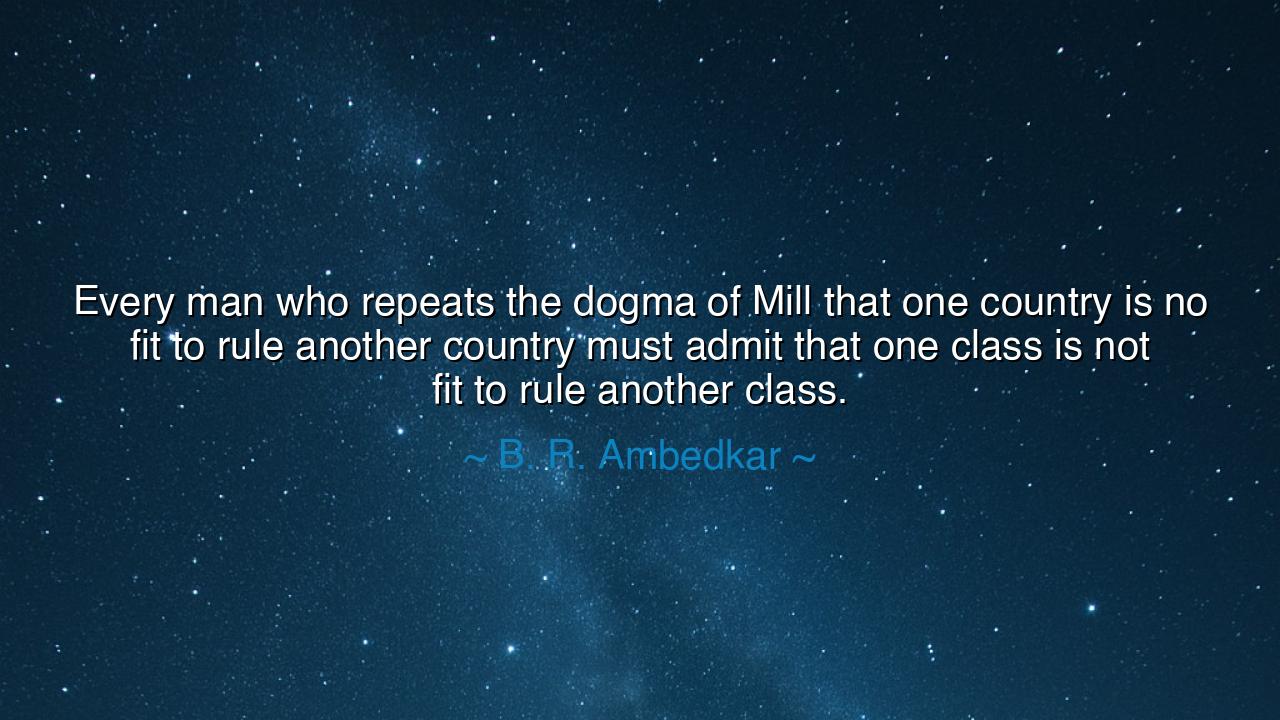
Every man who repeats the dogma of Mill that one country is no
Every man who repeats the dogma of Mill that one country is no fit to rule another country must admit that one class is not fit to rule another class.






B. R. Ambedkar, lawgiver of India and champion of the oppressed, once declared with thunderous clarity: “Every man who repeats the dogma of Mill that one country is no fit to rule another country must admit that one class is not fit to rule another class.” In these words he forged a sword of reason, linking the cause of nations with the cause of peoples. For if the cry of freedom is just when spoken by a nation under foreign rule, then it is just also when spoken by a people crushed within their own borders. Ambedkar laid bare the hypocrisy of those who demanded liberty from empire while denying it to their own poor and downtrodden.
The origin of this truth lies in the fires of colonial India. Inspired by John Stuart Mill’s teachings on liberty, countless voices declared that no nation should be subject to the tyranny of another. Yet Ambedkar, born an “untouchable,” saw a deeper wound: even as India sought freedom from Britain, it perpetuated chains within, where caste determined life and death. To him, it was folly to denounce imperialism while justifying caste oppression. Thus, he extended Mill’s maxim from nations to classes, showing that liberty is indivisible.
History bears witness to his insight. Consider the American Revolution, when colonists cried, “No taxation without representation!” Yet many of these same men upheld slavery, denying liberty to those whose chains enriched them. Their demand for freedom, noble in part, was stained by hypocrisy. So too in India, Ambedkar warned: to fight against Britain while ignoring the tyranny of caste was to win only a half-freedom, leaving millions still enslaved in their own land.
Ambedkar himself embodied this struggle. As the chief architect of the Indian Constitution, he labored to ensure equality and justice as the pillars of the new republic. His words demanded that independence be more than a flag or anthem—it must also be the destruction of caste domination. For what good is liberty from empire if a man is still enslaved by his neighbor? His cry was both philosophical and practical: no democracy can stand on the backs of the oppressed.
Therefore, O children of tomorrow, take Ambedkar’s wisdom to heart. Freedom is indivisible—to deny it to one group is to weaken it for all. Just as no nation is fit to rule another, no class is fit to lord over another. The true measure of liberty is not only in the independence of nations, but in the dignity of every man and woman within them. For a society that casts down its own is never free, and a nation that permits injustice within cannot rise to greatness without.






1T10T-33-Khai Tri
Ambedkar’s quote seems to suggest that the idea of one group having dominion over another—whether on a national or class level—is inherently unjust. By rejecting the dogma that one country can rule another, isn’t it essential to also reject the hierarchical structures that allow one class to dominate another? What kind of political and social reforms would be required to make society more equitable in both these respects?
TT30 - Lop 9.1 Nguyen Thi Tu
Ambedkar's insight on equality is striking. He raises an uncomfortable but necessary question: if we reject the idea of one country ruling over another, how can we accept a system where one class rules over another? Is this not a double standard? How do we reconcile our stance on international justice with the deep inequalities that persist within our own societies, especially in terms of class, race, and wealth?
GDGold D.dragon
This quote makes an interesting connection between colonialism and classism, pointing out a contradiction in liberal ideals. If we accept Mill's dogma about countries, shouldn’t we also apply that thinking to social classes? Are the structures of power that allow for one class to dominate another morally any different from the systems that justify imperialism? Is it time for societies to rethink how they perceive both political and social hierarchies?
DTVien Dinh Thanh
Ambedkar’s argument challenges us to think critically about the principles of freedom and equality. If we oppose colonial rule because one country should not dominate another, doesn’t it follow that we should also oppose class-based domination? What does it say about our values if we fight against imperialism abroad but accept similar inequalities within our own societies? Could this philosophy push for a more egalitarian approach to both governance and social structures?
CHCao Hieu
Ambedkar's quote draws a parallel between colonial rule and class oppression, challenging the notion that one group has the right to dominate another. If we acknowledge that no country should rule another, then how can we justify class systems where one class dominates another? Does this imply that the same principles that oppose imperialism should also oppose class inequality? How do we address these systemic inequities within our societies?